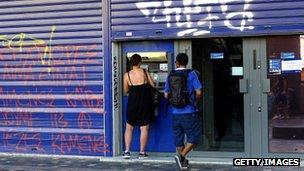Greece moves closer to securing latest bailout payment
- Published

Greece could soon receive the next chunk of international support after meeting targets
Greece has moved a step closer to receiving its next tranche of bailout funds after agreeing to the latest austerity measures demanded by the troika of international creditors.
Athens has agreed to cut 15,000 civil service jobs by the end of 2014.
The move follows the latest talks between Greece and the troika - the European Commission, European Central Bank and International Monetary Fund.
Greece is awaiting the release of 8.8bn euros (£7.5bn; $11.5bn).
Greek debt is currently 160% of the country's gross domestic product (GDP) and the IMF says it must be cut to 120% of GDP to be sustainable.
'Stabilised'
The IMF's mission chief to Greece, Poul Thomsen, welcomed the agreement on redundancies in the civil service.
"I am very pleased that the government is making a particularly determined effort in this area," he said. "It has always been a surprise to me... that it's been such a political taboo to get rid of people who underperform."
The troika's latest review said the job cuts would target "disciplinary cases and cases of demonstrated incapacity, absenteeism, and poor performance".
In addition, jobs will be lost from the closure or merger of government departments.
At the same time, new younger staff will be employed on less wages and more flexible contracts.
Greek Prime Minister Antonis Samaras said: "Greece is being stabilised and our position is being bolstered.
"That is not a human sacrifice, as some claim. Firing people who have disciplinary violations and hiring young and able people. It is a qualitative upgrading of the public sector and a demand of the Greek people."
'Soundness'
Greece has been supported by 270bn euros in bailouts since 2010.
In order to qualify, the country has had to cut spending and raise taxes, which has led to widespread hardship and prompted violent protests from some citizens.
Greece is trying to strengthen its banks so they can start to lend again.
The troika said that the country had almost completed the bank recapitalisation.
Most of the 50bn euros has been made available to the four leading Greek banks.
The troika's statement said: "The mission's assessment is that this will provide adequate capital, even under a significantly adverse scenario. These capital buffers will thus ensure the safety and soundness of the banking system and of its deposits."
In another development, the Greek finance minister, Yannis Stournaras, said the country would aim for a "primary budget surplus" - the surplus before taking into account debt financing costs - this year.
Talks between Greece and the troika have been underway since March.
Last week, shares in Greek banks fell up to 30% after plans to merge two of them were called off, amid fears the new entity would be too big to manage.
A finance ministry source said a planned merger would not now go ahead, although the four would be recapitalised.
All four banks had either already called or were set to call shareholder meetings to approve capital increases.